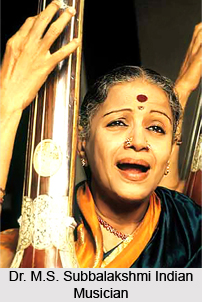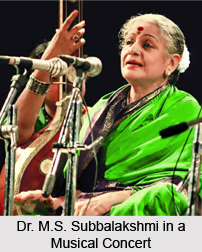 Dr. M.S. Subbalakshmi was one of the most charismatic and popular Carnatic musicians in India. She was the first musician to receive India`s highest civilian honor, the Bharat Ratna and also the first woman recipient of the title Sangeetha Kalanidhi. Subbalakshmi was the first Indian musician to be honoured with the Ramon Magsaysay award, which is Asia`s highest civilian award. Dr. M.S. Subbalakshmi was one of the most popular as well as most admired vocalists in the field of Carnatic music.
Dr. M.S. Subbalakshmi was one of the most charismatic and popular Carnatic musicians in India. She was the first musician to receive India`s highest civilian honor, the Bharat Ratna and also the first woman recipient of the title Sangeetha Kalanidhi. Subbalakshmi was the first Indian musician to be honoured with the Ramon Magsaysay award, which is Asia`s highest civilian award. Dr. M.S. Subbalakshmi was one of the most popular as well as most admired vocalists in the field of Carnatic music.
Early Life of Dr. M.S. Subbalakshmi
Madurai Shanmukhavadivu Subbulakshmi was born on September 16th, 1916, to the parents Subramania Iyer and Shanmukavadiver Ammal, in Madurai, Madras Presidency, in former British India. Her mother was a noted veena player and her father was lawyer by profession. Since she was born into a musical family, Subbulakshmi developed an interest in music from a very tender age and started training in Carnatic music under Semmangudi Srinivasa Iyer. She learned Hindustani music from Pandit Narayan Rao Vyas. She was also taught Telugu and Sanskrit by Dr. Nedunuri Krishnamurthy.
Dr. M.S. Subbalakshmi made her debut performance at the age of 13, in the year 1929, at the prestigious Madras Music Academy. Her performance was appreciated and admired by all the spectators and the critics as well. In the 1930`s, she learned Khayals and Thumris from Dwijenderlal Roy in Kolkata and later from Siddheshwari Devi of Benaras and Bhajans and Rabindra Sangeet from Dilipkumar Roy.
Career of Dr. M.S. Subbalakshmi
Dr. M.S. Subbalakshmi released her first recording was at the age of 10. In the Mahamaham festival at Kumbakonam, She gave her first public performance, when she was merely 16 years old. Subbulakshmi started giving her own concerts by the age of 17. In 1934, in her performance at the Madras Music Academy she was noticed and applauded by top rank musicians like Chembai Vaidyanatha Bhagavathar, Tiger Varadachariar, Karaikudi Sambavisa Iyer etc.
Dr. M.S. Subbalakshmi performed in numerous languages, including Hindi, Bengali, Gujarati, Tamil, Malayalam, Telugu, Sanskrit and Kannada. Subbalakshmi also entered the field of acting and performed in a number of movies. She made her film debut in the year 1938, with the movie Sevasadan. Her performance in the film Meera was also much appreciated. However, after the movie, Subbulakshmi quit acting and concentrated fully on concert music.
 Dr. M.S. Subbalakshmi has also performed in concerts all over the world like at Edinburgh festival and at the United Nations General assembly, Carnegie Hall as the inaugural concert at the festival of India in London in 1982 and Festival of India in Moscow in 1987. Subbulakshmi became India`s cultural ambassador and traveled to places like London, New York, Canada, the Far East, etc.
Dr. M.S. Subbalakshmi has also performed in concerts all over the world like at Edinburgh festival and at the United Nations General assembly, Carnegie Hall as the inaugural concert at the festival of India in London in 1982 and Festival of India in Moscow in 1987. Subbulakshmi became India`s cultural ambassador and traveled to places like London, New York, Canada, the Far East, etc.
Honours of Dr. M.S. Subbalakshmi
Her divine voice has earned acclaim from big and famous personalities like Mahatma Gandhi, Pandit Jawarharlal Nehru, Maharana of Udaipur etc as well as top rank musicians both in the Carnatic and Hindustani sphere in the country. Subbalakshmi has been the recipient of the highest awards and honors the nation could bestow upon an artist. She has been the recipient of significant international recognition too. She has earned doctorates from famed universities.
In 1998, Dr. M.S. Subbalakshmi was the first musician to receive the highest civilian award Bharat Ratna from the President of India. Padma Bhushan (1954), Padma Vibhushan (1975), Ramon Magsaysay award (1974), Kalidasa Samman Award (1988), Indira Gandhi Award for National Integration (1990) are some of the major awards she has received. She has also been honored as the court-singer of Tirumala Tirupati Devasthanams and has received the Bharath Rathna in 1998.
Personal Life of Dr. M.S. Subbalakshmi
Dr. M.S. Subbalakshmi married Sadasivam, a freedom fighter, in the year 1940. They had met four years earlier and he became instrumental in the continued success of her already flourishing career with his wide connections in the journalistic and political world. The couple did not have their own children. Sadasivam, her husband and inspiration, died in 1997. And after his death, Subbulakshmi stopped giving public performances.
Death of Dr. M.S. Subbalakshmi
Dr. M.S. Subbalakshmi suffered serious illness in the last days of her life. She was experiencing major complications connected with pneumonia and cardiac abnormalities and died on 11th December 2004. She passed away at the age of 88 leaving behind her large repertoire of classical, bhajan and film recordings.




















